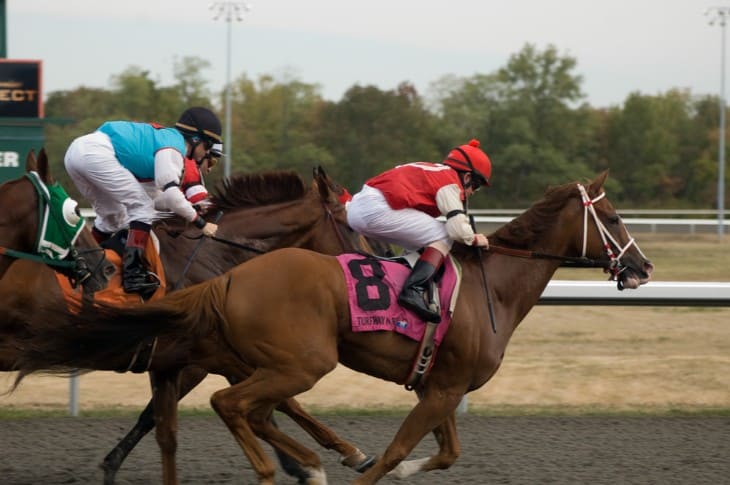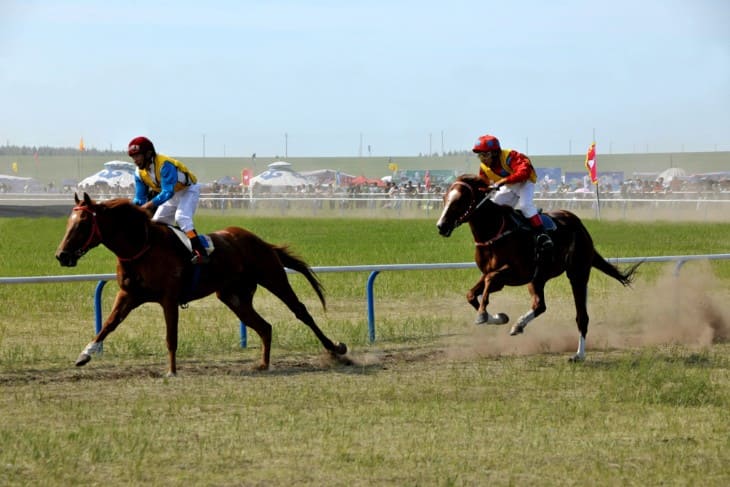Introduction
In the world of gambling, two seemingly disparate pursuits, horse racing and the lottery, share a common thread of anticipation and the thrill of betting on specific outcomes. While both offer opportunities for a shot at financial gain, they diverge dramatically in terms of skill, frequency, and the social fabric they weave. Horse racing, a sport steeped in tradition and strategy, allows for a blend of skill and chance, while the lottery offers simplicity and random chance. Delving deeper, we explore the unique dynamics that distinguish these two forms of gambling, from the racetrack's community spirit to the lottery's widespread allure, shedding light on the economic impact, regulation, and the critical issue of responsible gambling within each realm.
Betting on Outcomes
Betting on outcomes is a fundamental concept that underpins both horse racing and the lottery, but it takes on distinct forms and characteristics in each of these gambling activities.
In horse racing, betting on outcomes involves wagering on the performance of specific horses in a race. Punters can place bets on a variety of outcomes, including predicting the horse that will win the race, which horse will finish in second or third place (known as "place" and "show" bets), and even more intricate bets like predicting the exact order of the top two or three finishers (exactas and trifectas). Bettors analyze various factors such as a horse's past performance, jockey skills, track conditions, and even the horse's lineage to make informed decisions. This complex and multifaceted approach to betting on outcomes allows for a deep level of engagement and strategy.
In contrast, the lottery involves betting on the outcome of a random drawing of numbers. Players purchase tickets that feature a set of numbers, and they hope that the numbers on their tickets match those selected in the official drawing. Unlike horse racing, where knowledge and strategy can play a role, the lottery's outcome is entirely arbitrary. Players have no control over the numbers drawn, and winning is purely a matter of luck. This simplicity is a hallmark of lottery games, appealing to those who seek a more straightforward form of gambling.
Despite their differences, both horse racing and the lottery share the common element of excitement and anticipation associated with betting on specific outcomes. The thrill of watching a race unfold or waiting for the lottery numbers to be drawn creates a sense of suspense and engagement that attracts individuals seeking the excitement of gambling.
Randomness vs. Skill
In horse racing, the element of skill plays a significant role. Bettors can analyze various factors to make informed decisions when placing their bets. These factors may include a horse's past performance, jockey skills, trainer history, track conditions, and even the horse's lineage. This wealth of information allows seasoned bettors to develop strategies and handicapping methods to increase their chances of winning. Knowledgeable handicappers spend time studying race statistics, following the latest news in the horse racing world, and even visiting the racetracks to gain insights into the horses and conditions. This combination of skill and information can make horse racing a more engaging and challenging form of gambling, where expertise can lead to better outcomes.
Conversely, the lottery is characterized by pure randomness. Players have no control over the outcome, as the winning numbers are drawn entirely by chance. Whether you choose numbers based on personal significance, lucky numbers, or random selections, each ticket has an equal probability of winning. There is no skill involved in selecting the winning numbers, and no amount of analysis or expertise can influence the outcome. This inherent randomness is a defining feature of lotteries and distinguishes them from games of skill like poker or chess, where a player's decisions and strategies directly impact the result.
The contrast between randomness and skill extends to the player's sense of control. In horse racing, bettors may feel a sense of agency as they make choices and decisions based on their knowledge and analysis. In contrast, lottery players surrender control entirely to chance, as the drawing of numbers is beyond their influence. This distinction in perceived control can influence the psychology and motivations of individuals who are drawn to these different forms of gambling.

Frequency of Betting Opportunities
Horse racing offers multiple betting opportunities within a single day at racetracks. These events are typically organized into race cards, with several races scheduled throughout the day. Depending on the track, there may be as many as eight to twelve races in a single card. This frequent schedule of races provides bettors with the option to engage in betting activities regularly, often with relatively short intervals between races. This allows horse racing enthusiasts to immerse themselves in the sport and make a series of bets in a single visit to the track or through online platforms. The availability of various races and betting options caters to a diverse range of preferences and budgets.
In contrast, lotteries typically have specific drawing dates, and the frequency of these drawings can vary significantly. While some lotteries have daily drawings, others may hold weekly or bi-weekly events. Some lotteries even have large-scale jackpot drawings with less frequent occurrences, such as weekly or monthly. This less frequent schedule means that lottery players must wait for the designated drawing date to learn if they've won, and they often have to purchase tickets well in advance. The less frequent opportunities to participate in the lottery can create a sense of anticipation and excitement as players await the results.
The difference in the frequency of betting opportunities can also impact the gambling behaviour of individuals. With horse racing offering more regular betting occasions, some may find it easier to control their gambling habits and budgets, as they can choose when and how often to participate. In contrast, the less frequent nature of lottery drawings may lead to larger individual ticket purchases and potentially higher overall spending when players participate. Understanding these distinctions in betting frequency is essential for responsible gambling and managing one's gambling behaviour.
Variety of Betting Options
In horse racing, bettors have access to a wide array of betting options, each with its own level of complexity and potential payouts. This variety caters to individuals with different levels of experience and risk tolerance. Some of the most common horse racing bets include:
- Win: Betting on the horse that will finish first in the race.
- Place: Betting on a horse to finish in either first or second place.
- Show: Betting on a horse to finish in first, second, or third place.
- Exacta: Predicting the first and second-place horses in the correct order.
- Trifecta: Predicting the first, second, and third-place horses in the correct order.
- Superfecta: Predicting the first four horses in the correct order.
Additionally, there are exotic bets like quinellas, daily doubles, pick 3s, pick 4s, and pick 6s, which involve selecting the winners of multiple races in succession. This variety allows bettors to tailor their wagers to their level of expertise and risk appetite, making horse racing a highly customizable gambling experience.
In contrast, the lottery typically offers a more limited selection of betting options. Players generally choose a set of numbers and hope those numbers match the winning combination drawn. While some lotteries may have additional games or scratch-off tickets with varying themes, the core gameplay remains relatively simple. The straightforward nature of lottery betting appeals to those who prefer a less complex and more easily accessible form of gambling. However, the lack of diverse betting options means that lottery players have fewer strategies to employ compared to horse racing enthusiasts.
The wide variety of betting options in horse racing adds an additional layer of engagement and strategy, attracting those who enjoy analyzing races and experimenting with different betting strategies. This diversity also contributes to the social aspect of horse racing, as enthusiasts can discuss and share their unique betting approaches and experiences with others at the track or online.
Community and Social Aspects
Horse racing provides a rich social experience that goes beyond mere gambling. It offers an opportunity for people to come together, share in the excitement of the races, and form connections with others who share their passion for the sport. The sense of community and tradition associated with horse racing adds depth and meaning to the overall experience, making it a beloved pastime for many.
- Gathering at Racetracks: One of the most prominent social aspects of horse racing is the tradition of gathering at racetracks to watch the races in person. People from diverse backgrounds come together to witness the excitement of live horse racing. The atmosphere is often filled with anticipation, cheers, and camaraderie as spectators place bets, cheer for their chosen horses, and celebrate wins. Many racetracks also offer various amenities such as restaurants, bars, and lounges, creating a social hub where friends and families can spend quality time together while enjoying the races.
- Shared Experience: Attending horse races is not just about placing bets; it's a shared experience that brings people together. Friends and families can bond over the thrill of watching horses thunder down the track, the elegance of jockeys and their mounts, and the competitive spirit of the races. It's a chance for individuals to connect with others who share their passion for the sport, exchange tips and insights, and form lasting friendships. The social aspect of horse racing extends beyond the track, with enthusiasts often participating in forums, social media groups, and fan clubs to connect with fellow racing aficionados.
- Social Events and Traditions: Many horse racing events are steeped in tradition and offer a unique social experience. Iconic races like the Kentucky Derby and the Royal Ascot are not just sporting events but also social spectacles. Attendees don elaborate hats, and fashionable attire, and participate in time-honoured traditions such as singing "My Old Kentucky Home" at the Derby. These events become annual traditions for many, fostering a sense of community and belonging among participants. Additionally, horse racing events often feature live entertainment, concerts, and other social activities that enhance the overall experience for attendees.
Economic Impact
The economic impact of both horse racing and the lottery can be substantial, but they manifest in different ways:
Horse Racing:
- Job Creation: The horse racing industry generates numerous jobs, from trainers and jockeys to stablehands, track staff, and administrative roles. It also supports jobs in industries like agriculture (breeding and feeding horses) and tourism (hotels, restaurants, and transportation).
- Tourism: Major horse racing events often attract visitors from near and far, boosting tourism in the host regions. Events like the Kentucky Derby or the Grand National in the UK can have a significant economic impact by attracting tourists who spend money on accommodations, dining, shopping, and other local services.
- Tax Revenue: Governments collect taxes on horse racing-related activities, including betting and track operations. These tax revenues contribute to public funds and may be allocated to various public services, such as education and infrastructure.
Lottery:
- Revenue Generation: Lotteries are often operated or regulated by governments, and the revenue generated from ticket sales can be substantial. This revenue is typically earmarked for specific purposes, such as funding education, health care, or infrastructure projects.
- Retail Sales and Commissions: Lottery tickets are sold through various retail outlets, and these businesses earn commissions on ticket sales. This incentivizes retailers to participate in selling lottery tickets and contributes to local economies.
- Charitable Causes: Some lotteries are designed to support charitable causes directly. For example, in some regions, a portion of lottery proceeds goes to charities and nonprofit organizations, benefiting various social and community initiatives.
The economic impact of both horse racing and the lottery can vary depending on factors such as the scale of operations, the popularity of the sport or game, and the regulatory framework in place. Both industries contribute to employment, tourism, and tax revenues, which can have far-reaching effects on local and regional economies. However, they also raise important questions about the distribution of benefits and the allocation of revenue, as they involve gambling, which can have social and economic consequences for individuals and communities.
Regulation
Regulation in both horse racing and the lottery is essential to ensure that these forms of gambling remain fair, transparent, and safe for participants. It helps protect the interests of consumers, maintain the integrity of the games, and prevent illegal activities that could undermine public trust in these forms of entertainment. Additionally, responsible gambling measures are critical to addressing potential issues related to addiction and excessive gambling.
Horse Racing Regulation:
- State Oversight: In many countries, horse racing is regulated at the state or provincial level. Regulatory bodies oversee various aspects of the sport, including race integrity, licensing of participants (jockeys, trainers, and owners), and the operation of racetracks. These regulatory bodies exist to maintain the sport's fairness, prevent cheating, and enforce rules and regulations.
- Drug Testing: One of the essential aspects of horse racing regulation is drug testing for horses. Horses are subject to rigorous drug testing to ensure they compete fairly and without performance-enhancing substances. Regulatory authorities set strict guidelines for the use of medications and treatments to protect the welfare of the horses and the integrity of the races.
- Betting Integrity: To maintain public trust and prevent corruption, regulatory bodies often focus on betting integrity. They monitor betting patterns and investigate suspicious activities to prevent illegal gambling and match-fixing. This ensures that races are not manipulated to benefit certain individuals or groups.
Lottery Regulation:
- Government Oversight: Lotteries are typically operated or regulated by government entities at the state or national level. These entities establish rules, oversee ticket sales, and conduct drawings to ensure that lottery games are fair and transparent.
- Random Number Generation: Regulatory authorities oversee the random number generation process used in lottery drawings. Ensuring the randomness of numbers is essential to maintaining the fairness of the game and preventing manipulation.
- Consumer Protection: Regulations also focus on consumer protection. They may include requirements for advertising, responsible gambling measures, and the allocation of lottery proceeds to specific public purposes, such as education or healthcare.
- Responsible Gambling: In both horse racing and the lottery, regulation often includes provisions for responsible gambling. This includes setting age restrictions, providing information on the risks of gambling, and offering resources for individuals who may have gambling-related problems. Responsible gambling programs aim to mitigate the potential negative consequences of gambling and promote healthy participation.
Addiction and Responsible Gambling
In both horse racing and the lottery, responsible gambling measures are essential to mitigate the risks associated with addictive behaviour and excessive gambling. These measures aim to create a safer and more responsible gambling environment, ensuring that individuals can enjoy these forms of entertainment without experiencing harm to themselves or their finances.

Addiction Risks:
Horse Racing: While horse racing involves an element of skill and strategy, it can still lead to gambling addiction for some individuals. Those who become emotionally invested in the sport or develop patterns of compulsive betting may be at risk. Factors such as the frequent availability of races and the excitement of live events can contribute to addictive behaviour.
Lottery: Lottery addiction is a recognized issue, often stemming from the ease of access to tickets and the allure of large jackpot prizes. The randomness of the lottery draws, combined with the hope of a life-changing win, can lead some individuals to spend excessive amounts on tickets. The potential for addiction is exacerbated by the simplicity of lottery games, making it easy for players to engage repeatedly.
Responsible Gambling Measures:
- Self-Exclusion Programs: Both horse racing and the lottery offer self-exclusion programs, allowing individuals to voluntarily exclude themselves from participating for a specified period. This measure provides a way for those who recognize a gambling problem to seek help and take a break from gambling.
- Information and Resources: Responsible gambling initiatives provide information on the risks associated with gambling and direct individuals to resources for support and counselling. Hotlines, websites, and local support services are often available to assist those in need.
- Age Restrictions: Strict age restrictions are enforced to prevent underage gambling. Regulators and operators take measures to verify the age of participants to ensure that only adults are allowed to engage in these activities.
Education and Awareness:
- Public Awareness Campaigns: Regulatory bodies, operators, and advocacy groups often run public awareness campaigns to educate the public about responsible gambling. These campaigns aim to reduce the stigma associated with seeking help for gambling-related problems and emphasize the importance of setting limits.
- Financial Management: Responsible gambling programs may include guidance on financial management to help individuals avoid excessive losses. This can involve setting budgets, tracking spending, and knowing when to stop gambling.
- Preventing Problem Gambling: Regulatory authorities work to implement policies that prevent problem gambling, including limiting advertising that targets vulnerable populations and monitoring gambling activities to identify potential issues early.
Summary
Horse racing and the lottery are distinct forms of gambling with similarities and differences. Both involve betting on outcomes, but horse racing allows for skill-based betting while lotteries rely entirely on chance. Horse racing offers more frequent betting opportunities through multiple races in a day, while lottery drawings are less frequent. The variety of betting options is greater in horse racing, allowing for a more customized gambling experience, whereas the lottery primarily involves selecting numbers. Both activities have economic impacts through job creation, tourism, and tax revenue. Regulation ensures fairness and consumer protection in both, while responsible gambling measures aim to address addiction risks and promote healthy participation.
For more information:








